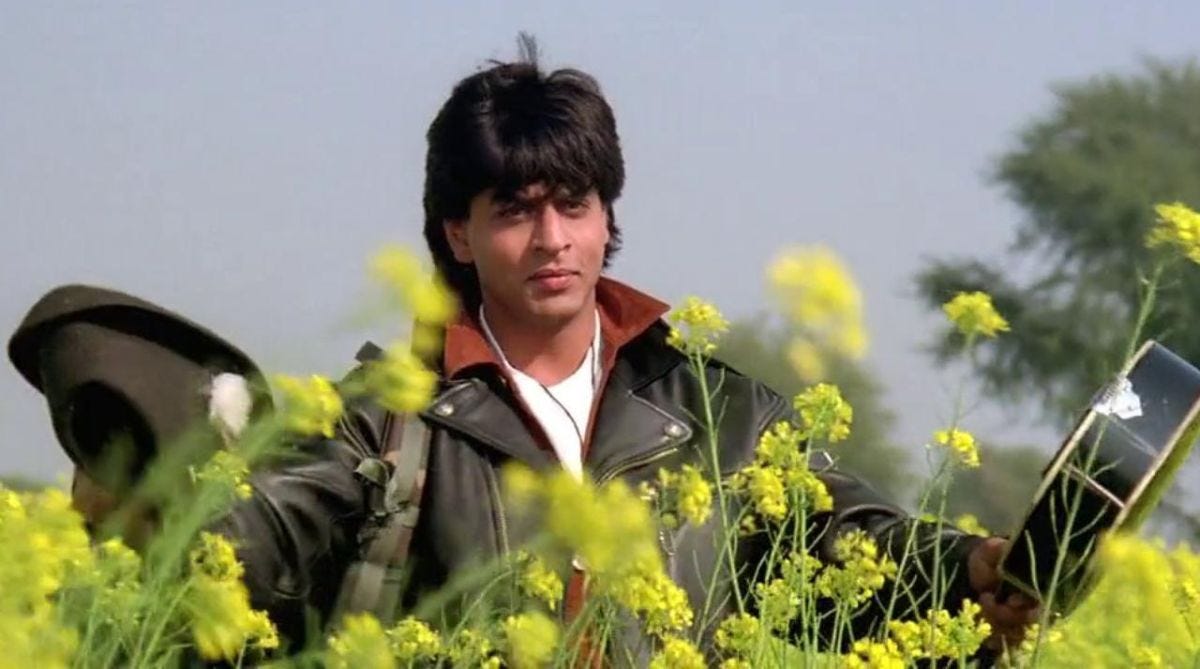Movies in the 70s and the 80s had a common theme: the lead actor would be a typical hero - poor had injustice been done to him, and challenged and defeated the rich. These movies were what made Amitabh Bachchan, the Angry Young Man.
The 90s gave us the liberalisation of our economy and culture, and then came 1995 which told us the story of Raj (SRK) and Simran (Kajol). Simran’s father is a typical Indian man whose love language is control. She wants to travel across Europe so she acts all Sanskari and she manages to get permission. During the trip, she meets Raj and falls in love as the trip ends. Raj realises that too, but by the time he goes to confess his love, she has left for India to get married to a man her father has chosen.
Raj goes to India with the intention of winning her dad’s heart, befriends her fiance, and gets invited to the wedding. She even asks him to elope, but he says no and that they would convince her dad. He tells lies so elaborate that even present-day politicians would take notes, and thus becomes everyone’s favourite. But finally, everyone discovers who he is, and he prepares to leave for the UK. At the station, he gets beaten up by the fiance and his friends, but manages to beat the shit out of them. Simran’s dad comes to the station with her, looks at bloody (literally) Raj, and realises that no one in the world would love her more than him and says, “Ja, Simran, ja. Jee le apni zindagi.”
Now, marriages in those times were always arranged. Women could not marry the man they loved. They married first and then fell in love with their husbands. Maybe they never even fell in love with their husbands. (Men? They will fall in love with the first woman they see!)
Here is a movie that shows to an Indian woman that she can fantasise about the man she wants, the man of her dreams. In fact, that is how Simran is introduced to the viewers - with her describing the man of her dreams (Mere khwabon me jo aae).
The movie doesn’t stop at Simran finding the man of her dreams. There is an opposition, that Indians are facing even today after almost three decades of the movie. She has to choose to either to accept her father’s choice or to fight.
It shows us that no matter what your caste, your religion, what your parents think of love marriages, or what your parents think of your partner, your parents might turn around. Might. It gives us hope. All you need to do is fight for your love.
DDLJ set the foundation for future love stories in India.
Thus DDLJ is not just a story of Raj and Simran, it’s a story of millennials who get to see that falling in love is an option. It’s a story of two lovers who fight for each other. A story of two lovers who fight the very people they loved. A story where they win. And a story where no dies. It teaches an entire generation to fall in love. A story that has created millions of love stories.
It will continue to inspire us as long as parents might have strong opposition to their children marrying the love of their lives.
Addendum
Continuing with the trend, why Shahrukh is the most important actor of our generation.
Coming back to the point with which I started the post: the movies used to be about male actors. They were the “heroes”. Female actors were just devices of the plot that helped develop the hero’s character arc. They rarely had their own character arcs.
You can have a Sholay without Basanti, a Zanjeer without Mala, a Deewaar without Neera, a Don without Roma, and so on.
Shahrukh was the one whose movies had female actors with their own character arcs and without whom the movie would not even be there. And there were many such movies starring him.
You cannot have a DDLJ without Simran, a Kuch Kuch Hota hai without Anjali, a Devdas without Paro and Chandramukhi, a Veer Zaara without Zaara, a Dil to Pagal hai without Pooja and Nisha, a Kal Ho Na Ho without Naina, a Rab ne bana di jodi without Taani, and so on.
His movies brought representation to half of the population. It gave them a voice when it came to matters of love.
His characters were not larger-than-life heroes, they were normal men with extraordinary love.
His movies addressed different outcomes of love as well:
K3G: Father doesn’t accept the woman his son loves, but the son goes ahead and marries her anyway. Gets disowned. But finally, the father realises his mistakes and all is good. (If things don’t go the DDLJ way, they go the K3G way.)
Mohabbatein: The daughter dies by suicide because her father is against her love but he finally realises his mistake.
Veer Zaara: Veer waits for many many years to reunite with his love.
Devdas: He agrees to his father’s decision to not marry the woman he loved and lives a miserable life.
Shahrukh inspired an entire generation to fall in love. It showed us how a man should be (At least, how Rahuls should be!!! :P). He gave us men the blueprint of how to be a romantic.
No wonder, despite not being the best-looking actor, not the best actor, he’s managed to capture women’s hearts.
Also, props to Yash Raj and Karan Johar for creating these movies.





पैसा, इज्ज़त, नौकरी और जाती देखकर होती है शादियां,
पर अक्सर सुना है लोगों से 'जोड़ियां उपर वाला बनाता है'.
I too love SRK's movies, especially DDLJ and KKHH, but really didn't know it could have such deep messages that showcase those immense phases of love.
Hats off to your research. 👌